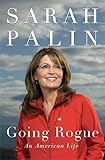
 Early in the year I tried — no kidding — to read everything ever written by and about Sarah Palin. Going Rogue, Sarah from Alaska, America by Heart, you name it. I had it in my head that I was going to write a bitterly funny book about modern politics. Working title: The Palin. A satirical monster story about a blood-hungry, wolverine-like creature that terrorizes a small northern town before being driven back into the woods. The research process, initially undertaken with great enthusiasm, soon turned grim. I lasted about a month before surrendering. It was like the literary equivalent of Morgan Spurlock’s Super Size Me. I almost wish I had filmed it.
Early in the year I tried — no kidding — to read everything ever written by and about Sarah Palin. Going Rogue, Sarah from Alaska, America by Heart, you name it. I had it in my head that I was going to write a bitterly funny book about modern politics. Working title: The Palin. A satirical monster story about a blood-hungry, wolverine-like creature that terrorizes a small northern town before being driven back into the woods. The research process, initially undertaken with great enthusiasm, soon turned grim. I lasted about a month before surrendering. It was like the literary equivalent of Morgan Spurlock’s Super Size Me. I almost wish I had filmed it.
 In search of a palate cleanse, I moved on to late-phase David Markson, the non-novel novels: Reader’s Block, This is Not a Novel, Vanishing Point, and The Last Novel. It’s like reading like the best Twitter feed in history, a rapid-fire but far from accidental collage of factoids and quotes and letter excerpts and gossip drawn from the super fine print of art and literary history. Stuff like: “For some years, Marcel Duchamp was the second ranked chess master in France.” And: “T.S. Eliot was afraid of cows.” This is experimental fiction at its finest — way-out-there books that also manage to be compulsively readable. No plot. No characters. No linear progression. And yet somehow deeply emotional. Markson, who died in 2010, looms large on every page — you can almost hear the gears of his mind turning — and mortality is the unmistakable undercurrent. The cumulative effect sneaks up on you. These are books about books, books about the making of art. And mostly they’re about a man facing down death with courage, by reading and thinking and writing.
In search of a palate cleanse, I moved on to late-phase David Markson, the non-novel novels: Reader’s Block, This is Not a Novel, Vanishing Point, and The Last Novel. It’s like reading like the best Twitter feed in history, a rapid-fire but far from accidental collage of factoids and quotes and letter excerpts and gossip drawn from the super fine print of art and literary history. Stuff like: “For some years, Marcel Duchamp was the second ranked chess master in France.” And: “T.S. Eliot was afraid of cows.” This is experimental fiction at its finest — way-out-there books that also manage to be compulsively readable. No plot. No characters. No linear progression. And yet somehow deeply emotional. Markson, who died in 2010, looms large on every page — you can almost hear the gears of his mind turning — and mortality is the unmistakable undercurrent. The cumulative effect sneaks up on you. These are books about books, books about the making of art. And mostly they’re about a man facing down death with courage, by reading and thinking and writing.
 Most recent book that I read and liked: Leaving the Atocha Station, by Ben Lerner. This one, too, is concerned with the making of art (I guess this stuff has been on my mind). Lerner’s novel is lean but heavy, and beautifully written, with plenty of wince-while-laughing comedic moments. A very clever inversion of postmodern fiction’s basic model. The protagonist, Adam Gordon, is an avant-garde fuck-up, a gifted young poet (much like the author himself), a Fulbright Scholar drifting in Madrid. He smokes too much hash. He takes too many pills. He mangles the Spanish language and bumbles his way through readings. There are trains. There are lies. There are unsatisfying liaisons with two different women. And above all else, there is the search for the real — both internal and external. I’ll probably read this one again.
Most recent book that I read and liked: Leaving the Atocha Station, by Ben Lerner. This one, too, is concerned with the making of art (I guess this stuff has been on my mind). Lerner’s novel is lean but heavy, and beautifully written, with plenty of wince-while-laughing comedic moments. A very clever inversion of postmodern fiction’s basic model. The protagonist, Adam Gordon, is an avant-garde fuck-up, a gifted young poet (much like the author himself), a Fulbright Scholar drifting in Madrid. He smokes too much hash. He takes too many pills. He mangles the Spanish language and bumbles his way through readings. There are trains. There are lies. There are unsatisfying liaisons with two different women. And above all else, there is the search for the real — both internal and external. I’ll probably read this one again.
More from A Year in Reading 2011
Don’t miss: A Year in Reading 2010, 2009, 2008, 2007, 2006, 2005
The good stuff: The Millions’ Notable articles
The motherlode: The Millions’ Books and Reviews
Like what you see? Learn about 5 insanely easy ways to Support The Millions, The Millions on Twitter, Facebook, Tumblr.









